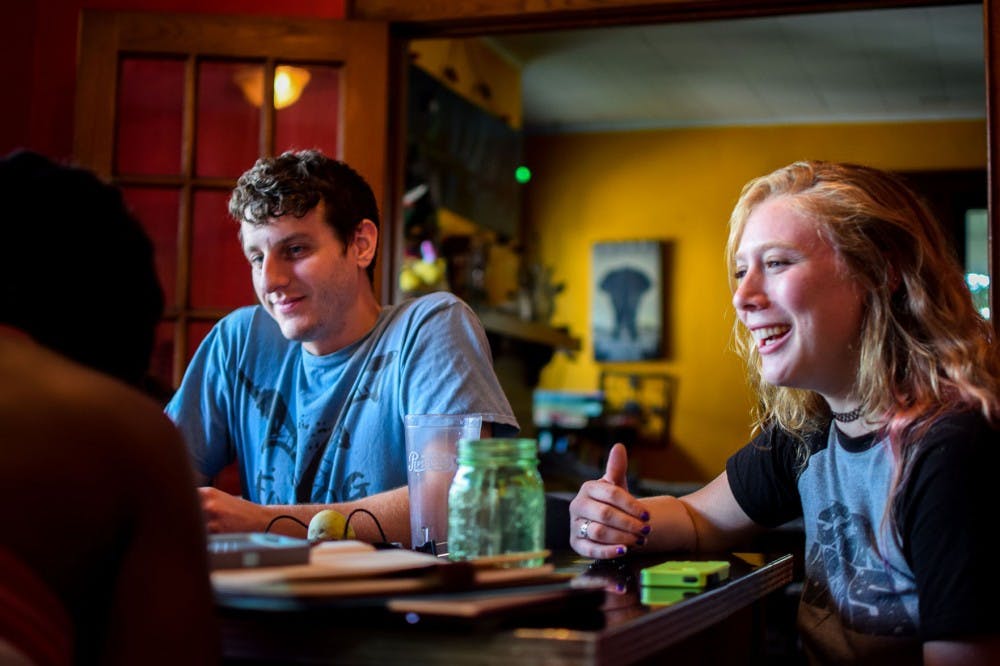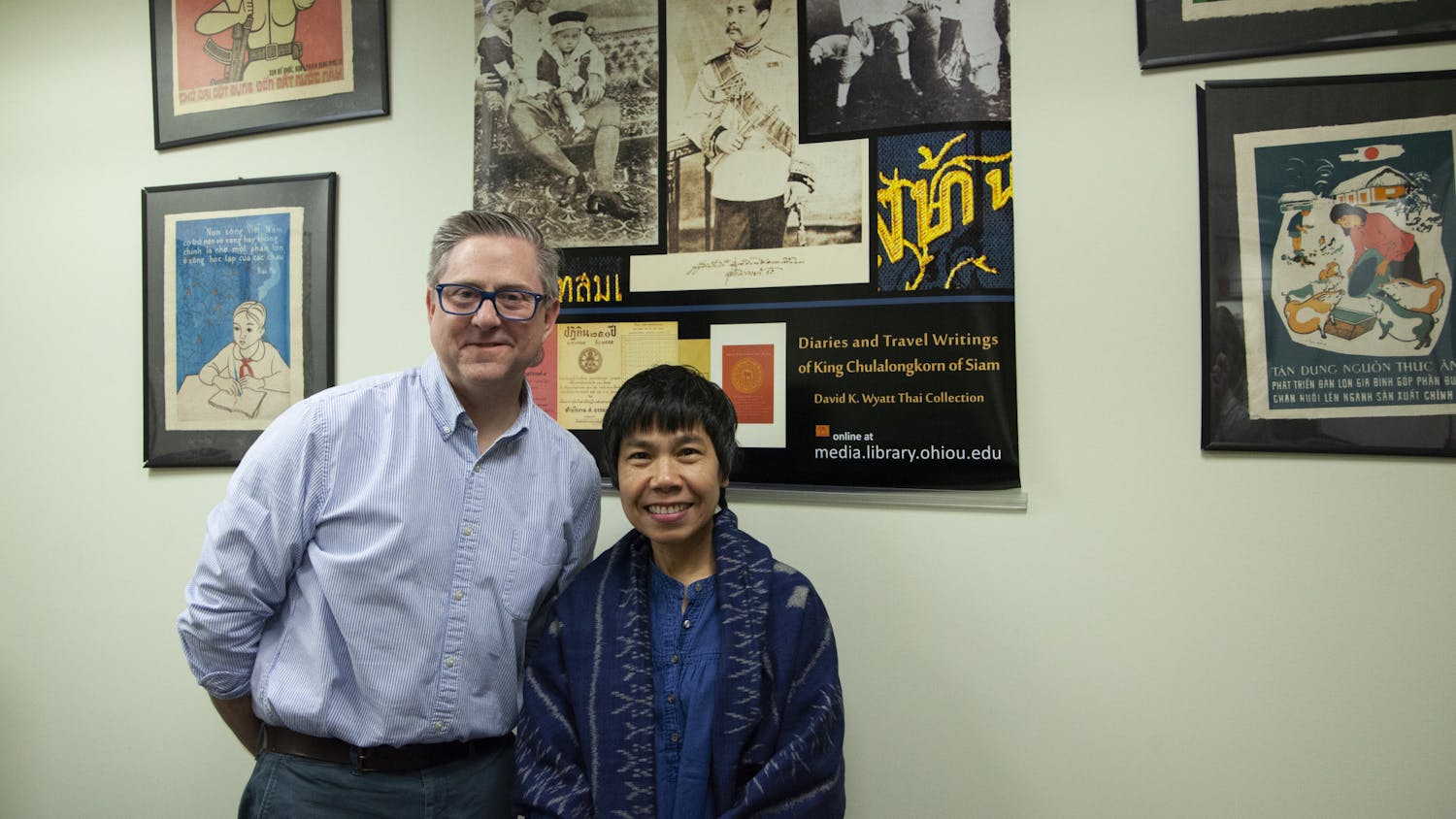Cooperatives exist in different forms in Athens and nationwide and center on co-living or co-working.
When the ceiling began to collapse at 23 Elliott St., the residents didn’t have to call their landlord and wait to get it fixed. Instead, they voted at their weekly meeting and used their house funds to solve the problem themselves.
It’s one of the perks of being a resident of The Vine Co-op, Jolana Watson, a resident of the Vine, said.
A co-op, formally known as a cooperative, is “a group of people working together in a joint economic activity that is owned and operated by its members for their mutual benefit,” according to the Midwest Association of Housing Cooperatives.
Members of the Vine share the responsibilities of a landlord, doled out through individual “house jobs,” such as maintenance director and gardener. When a decision needs to be made that will affect the whole group, it is made through a democratic voting process.
In a housing co-op, an emphasis is placed on cooperation. Compromise is encouraged in all aspects of co-op life and opinions of all tenants are considered when decisions are made.
“We do have to work together. We have to vote. We have house meetings,” Elli Magden, a resident of the Vine, said. “It creates this bonding between us that sometimes just living in a house with people doesn’t really promote.”
Vine resident Collin Black also takes pride in residents who decide on new membership when openings arise.
“To me, the best part about not having a landlord is we’re the ones that recruit for this home, so we can keep the culture alive or in the direction that the Vine needs to go,” the senior studying middle childhood education said.
Interested residents can apply to live in the Vine via an application found on its Facebook page, which asks questions such as “How do you resolve conflict with others?” and “What are some of your favorite ways to stimulate your imagination?”
{{tncms-asset app="editorial" id="54d0e962-5c0a-11e5-885b-db641aa93344"}}
Vine residents also enjoy the ability to keep a pet in the house. The Vine owns a cat named Noochy Boots, whom residents voted on keeping after finding him a year ago behind Kroger.
Apart from the pet policy — or lack thereof — the Vine imposes relatively few rules and allows its members to make the decisions a landlord would normally make, Watson, a senior studying media and social change, said.
“We try to keep good people living around here and keep it open with as little rules as possible,” Black said.
Some residents said they feel a sense of personal growth after having lived in the Vine.
“It also helped a lot with learning about appropriate ways for conflict resolution. When you live with this many people, there’s always going to be some conflict,” Magden said.
Formed in the early 1990s, the Vine is part of a national network of co-ops owned by NASCO, the North American Students of Cooperation, which aims to organize affordable co-op housing and promote a “community-oriented cooperative movement,” according to the NASCO website.
For instance, Vine residents pay nearly $400 per month, money that covers rent, shared food, parking, supplies and Internet.
Daniel Miller, the director of properties at NASCO, said there appears to be a trend of more people becoming interested in co-op living, but it can be hard to tell.
“It’s a little difficult to get good data on this,” Miller said. “It’s something that we’ve been working on. Partly because people may have a lot of different definitions of exactly what they mean by ‘cooperative.’ ”
International Cooperative Alliance Housing estimates there are roughly 1.2 million co-op housing units in the United States.
Not the average cubicle
Ben Lachman and Michael Blohm both work in the same office, but they don’t share the same field of work or employer.
However, they do share almost everything else in their office space, whether it be fair trade coffee, a conference room or ideas.
They are remote workers at Athensworks, a co-op working space suited for remote workers, or employees and contractors who would otherwise work from home. An alternate to the 40-hour work week in the traditional office space, co-working allows workers to choose their schedules and have a space away from distractions.
“The nice thing, from my perspective, is it kind of lets you work around your productivity rather than forcing productivity onto your work,” Blohm, a contract-based games programmer and web developer, said.
Unlike the Vine, members of Athensworks do not have ownership of the space, but rent it out from the Central Avenue Church. But the idea remains the same — the people who work in the space might not have much inherently in common, but they share ideas and space and govern it together.
Catalyzed by the recent surge in startups, co-op work spaces have emerged as an affordable way for workers from different fields to converge. Some workers may not be ready, financially or otherwise, for the commitment of buying an office. Although anyone can choose to work in the space, Blohm said the concept lends itself well to contracted workers who are used to “inconsistent sources of income.”
A full individual membership for Athensworks costs $100 per month. Nonprofit businesses pay $50 per month per seat. Businesses pay $100 per month per seat. “Seats” are the number of workspaces allotted for that business.
The range of different jobs found at Athensworks encourages collaboration among workers in fields that would normally never facilitate conversation.
“It’s not just software developers,” Lachman, who founded Athensworks nearly three years ago, said. “There have been many different people from movement artists, to yoga teachers, to videographers, to photographers, to writers, to teachers, to students. The cast has changed, but the diversity has always been there in some respect.”
{{tncms-asset app="editorial" id="0bd11624-51ab-11e5-bc66-67f4e43df617"}}
When one member’s husband accepted a position at Ohio University, she could keep her position working for a company in Boston by utilizing office space through Athensworks.
“She’s in Athens and she’s still able to do her very specialized form of work even though Athens maybe doesn’t have that kind of job locally or originally,” Lachman said.
A taste of ownership
The idea of co-operatives in Athens dates further back than both the Vine and Athensworks. Local restaurant Casa Nueva was founded in 1985, following the closure of a restaurant named Casa Que Pasa.
A group of eight of its unemployed workers decided they wanted to open their own worker-owned business, Candida Stamp, human resources coordinator at Casa, said.
When the business first started, all workers cooperatively owned and ran the business. As Casa expanded and changed, so did its methods of ownership.
“In 1999 and 2000, they switched over the business so it wasn’t all worker-owners anymore,” Stamp said. “Right now, we have 24 worker-owners out of about 75 employees. So not everyone here is an owner, but all of the owners do work here.”
Despite the status, all workers still have a voice in the business.
Three different types of employees exist, Stamp said. Workers begin as associates, which are employees without ownership. Worker-owners have ownership and can vote in meetings. Trial members have accumulated at least 1,000 hours of work and aspire to be worker-owners.
All workers receive a slice of Casa’s profits, though the amount of shares they have of the profits depends on how many hours they have worked. In addition to the restaurant’s profits, workers also receive a base wage depending on the type of employee and a 15-cent raise for each thousand hours worked.
“The members are able to vote on the bigger decisions, but with … day-to-day things, everybody here has a voice,” Stamp said. “That’s one of the biggest benefits of being a worker-run business.”






